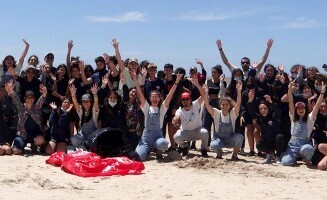
EU adopts new rules to significantly cut packaging waste with re-use targets
The European Union has formally adopted a regulation on packaging and packaging waste. The new ...

UNESCO and the Ministry of Environment of Uruguay have organized a clean-up day in coastal areas and a workshop in place focused on concepts about the risk of plastic and microplastics in the environment.
The UNESCO Intergovernmental Hydrological Program in Latin America and the Caribbean (IHP-LAC), together with the National Water Directorate of the Ministry of Environment of Uruguay (DINAGUA), in coordination with REPAPEL, organized an educational day to clean up the coastal area of the Solymar river beach on Calcagno Avenue in Canelones, Uruguay, part of the La Plata Basin on Thursday, 9th December.
The activity counted on the participation of around 80 young people and educators. It consisted of a three-hour day led by REPAPEL environmental educators who proposed participatory activities, questions on environmental issues and games to the young people of the Shangrilá High School and “El Propio” Youth Center, who enthusiastically joined in with their teachers, associated professors and referent leaders.
The day began with a brief talk on the problem of plastics and microplastics, the garbage that reaches rivers and then the sea, where it is causing great impacts on the quality of the environment, the water and marine fauna. The approach started from particular cases in terms of personal behaviors to global behaviors focused on the incidence of coordinated resources management.
With the idea of promoting teamwork and active participation in the territory, the youth were organized in groups to collect waste along the foot of the dunes and the water’s edge, classifying the materials for later recycling and discarding them in differentiated bags. The waste collected was characterized in terms of types of materials, origin, condition, and uses in registration forms.
At the closing of the activity, a talk took place again about the waste that was found, and through the exchange with the adolescents, awareness of coastal biodiversity was promoted, and possible alternatives were discussed to reduce the impact of human activities on water quality, dunes, psammophilous vegetation, and migratory and resident species.
The activity resulted in an active experience on the coast where the problem of waste and its impact could be visualized and good environmental practices can be strengthened, also involving institutional support and young people who are the present and the future of the world.
The European Union has formally adopted a regulation on packaging and packaging waste. The new ...
Inaugurating the Abydos Solar Power Plant in the Upper Egypt governorate of Aswan represents a ...
Businesses that fail to adapt to climate risks like extreme heat could lose up to ...


اترك تعليقا